U2 Grammar
U2 Grammar 2
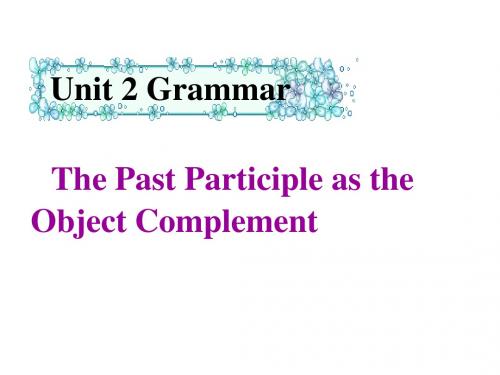
bite
I saw _______________________ him bitten by a dog.
I saw him beaten by his mother.
I saw him bitten by a dog. I saw him robbed by a man. I saw him knocked down by a car. I saw him taken to the hospital.
2.Though I have often heard this song ______, but I have never heard you _____ it.
A. singing, sing B. be sung, singing
C. sung, sing D. sung, singing
本题答案是C. sung, sing。第一空格填sung ,过去分词作宾补, 表被动,第二个空格填sing ,不定式作宾补,表过去的经历。这 句话的意思是,虽然经常听到别人唱这支歌,但是我从未听你唱 过(这支歌)。
2.表使役的动词:have, make, get等。 have /get + n. /pron. + p.p Speak a little louder to make yourself h eard by us all. 说话声音大一点,让我 们都听到。
We should work harder to get the work done on time. 我们应该努力工作以按时 完成任务。
4. with his hands (tie); with many flowers (plant) around the building The thief was brought in with his hands tied behind his back. With many flowers planted around the building, his house looks like a beautiful garden.
U2 Grammar

【梳理】 主语 (如例句1)。 1.动词不定式可以在句中作_____ It 2.在例句2和例句3中,_____ 是形式主语,真 动词不定式 。 正的主语是后面的___________
Unit 2 Grammar
We can use an infinitive as the subject of a sentence.
Unit 2 Grammar
A2 Complete the paragraph below with the words from the box.
become a scientist do Maths
go to university try again
At school, Einstein’s ability (1)___________ to do Maths surprised his teachers, but he was bored with other subjects. At the age of 15, he was given the chance (2)__________________, to go to university but he did not do well enough in the exam.
深圳版牛津英语九年级上册课件U2 Grammar
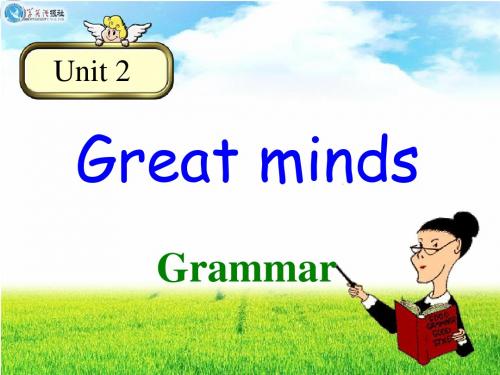
1
1
At school, Einstein’s ability _to__d_o_M__a_t_h_s surprised his teachers, but he was bored wAit2hCotohmerplseutbejtehcetsp. aArtatghreapahgeboeflo1w5,whieth watshegiwveonrdths efrcohmantchee _tbo_o_xg_.o_(t_Po_2_u4_n)_iv_e_r_s_it_y_, butbheecodmidenaostcdieonwtisetll egnooutoghuninivtehresietxyam. HeddoidMnaotthlsose heart, hotrwyeavgera,inand he had a wisht_o_t_r_y_a_g_a_i_n_ the next year. This time, he succeeded. He kept trying, so he achieved his dream _to__b_e_c_o_m_e__a_s_c_ie_n_t_i_st_.
question? 6. My wish to visit France has come true at
last.
1. Einstein often received i_n_v_i_ta_t_io_n__s _ _to__e_x_p_l_a_in__ his theories at different
1.To do that sort of thing is foolish. 主语
2.I want to see you this evening.
宾语
动 词 不
3.The purpose of education is to develop
9上u2 Grammar

课题:九上Unit 2 ColoursGrammar主备:课型:新授审核:区九年级英语备课组班级姓名学号【教学目标】1.掌握下列词汇、词组和句型,并能熟练朗读和运用。
词汇:relationship, certainly, everyday, personal, ancient词组:influence our everyday lives in many ways句型:Some people believe that colours can influence our moods.True, but it depends on personal taste.You may wonder if/whether colours influence our moods.Was yellow once the colour of the rulers in ancient China?2. 学会运用that引导的宾语从句。
3. 学会运用if或whether引导的宾语从句。
【教学重难点】能正确理解that, if或whether引导的宾语从句,并能灵活运用。
【教学过程】Step1. Lead-inHave a free talk with the Ss about colours and moods.Step2. Presentation and PracticeⅠ1. Present object clauses introduced by that.2. Finish some exercises.3. Finish the exercises on Page 26 and check the answers.Step3. Presentation and PracticeⅡ1. Present object clauses introduced by if or whether.2. Present the differences between if and whether and do some exercises.3. Finish some exercises.4. Finish the exercises on Pages 27-28 and check the answers.Step4. HomeworkFinish off the exercises on the teaching and learning paper.【语法小贴士】宾语从句一、概念宾语从句是指在复合句中充当宾语的句子。
U2 Grammar课件 (牛津版七年级上册)

(见全品11)
[探究] (1)make 用作使役动词,意为“使得”。 如: Your help made the work easy. 你的帮助使这项工作容易了。 (2)make用作实义动词,意为“做;制作”。如: Can you make a cake?你会做蛋糕吗? (3)“make sb./sth.+adj.”意为“使某人/某 物……”。如:The news makes him very happy. 这则消息使他非常高兴。
Practise
你家有多少口人? — How many members are there in your family? 1. 她是阅读俱乐部的一名成员。 She is a
member of the Reading Club.
2. 我们是学校篮球队的成员。 We are members of our school basketball team.
(2)接句子:hope+从句 I hope I can be a doctor like my father. 我希望我能成为一名像父亲一样的医生。 My mother hopes I can be a doctor. 我母亲希望我能成为一名医生。 [拓展] 特殊用法:hope可以和so连用。 I hope so.我希望如此。 We hope so.我们希望如此。
(见全品10)
句中的 hope.(vt.&n.)希望 。 [观察] I hope his dream comes true. 我希望他的梦想能够实现。 We hope to visit England some day. 我们希望有一天能够参观英国。 [探究] hope有以下几种用法: (1)接动词不定式:hope to do sth. I hope to be your friend. 我希望成为你的朋友。 We hope to visit the Great Wall. 我们希望去参观长城。 [注意] 不能说:hope sb. to do sth.
高一英语人教必修1课件:U2 Grammar

7. My teacher always said, “What an interesting and challenging job teaching is!”
→_M__y_t_e_a_c_h_e_r_a_lw__a_y_s_s_a_i_d_w__h_a_t _a_n____ _in_t_e_r_e_st_i_n_g_a_n_d__c_h_a_l_le_n_g_i_n_g_j_o_b_____ _te_a_c_h_i_n_g_w__a_s__.
class,” our English teacher said to us. →_O_u_r__E_n_g_l_is_h__te_a_c_h_e_r_s_u_g_g_e_s_t_e_d_t_h_a_t_w__e_
_(s_h_o_u_l_d_)_s_p_e_a_k__E_n_g_l_is_h__m_o_r_e_o_f_t_e_n_t_h_a_n_ _ju_s_t_i_n__cl_a_s_s___. →_O_u_r__E_n_g_l_is_h__te_a_c_h_e_r_s_u_g_g_e_s_t_e_d_s_p_e_a_k_i_n_g _E_n_g_l_is_h__m_o_r_e__o_ft_e_n_t_h_a_n__ju__st_i_n__c_la_s_s_.
3. Kate said, “Let’s discuss the problem tomorrow.”
→_K_a_t_e_s_u_g_g_e_s_t_ed__d_i_sc_u_s_s_i_n_g_t_h_e_p__ro_b_l_e_m__ _th_e__n_e_x_t_d_a_y_.
→_K_a_t_e_s_u_g_g_e_s_t_ed__t_h_a_t_w_e__(s_h_o_u__ld_)_d_i_s_c_u_s_s _th_e__p_r_o_b_l_em___th_e__n_e_x_t_d_a_y_.
U2---Grammar

简单句的五种句型 主语+系动词+表语 主语+不及物动词 主语+及物+宾语
主语+及物动词+宾语1+宾语2 主语+及物动词+宾语+宾语补足语
英文表示 S + V + P S + Vi S + Vt + O
S +Vt +O1 + O2
S + Vt+ O + C
句子成分
主语(subject)
主语就是------发出动作的人或者物。 找出下列句子的主语。 1. 昨晚我写了一封信。 2. 今天下午我想同你谈谈。 3. 他读过这本书几次了。 4. 他们成功地完成了计划。 5. 你们必须在两周内看完这些书。 6. The book is so interesting. 7. My brother and sister are at home. 8. The weather is perfect.
1. This is a grammar book. 2. The dinner smells(闻) good. 3. He felt happy. 4. Everything looks different. 5. He is tall and strong. 6. The book is interesting. 7. The weather became cool. 8. His face turned red.
1. There are 15 students in my class.
2. Guilin is a beautiful city.
3. A bright future shines before my eyes.
牛津译林版七年级上册(新)英语课件:U2 Grammar(28张)

以辅音字母加y结尾的 carry→carries 动词,先变y为i,再加-es worry→worries 特殊变化 have → has
行为动词一般现在时的否定句式: I do not (don’t) go to school on Sunday. She doesn’t speak English. They do not (don’t) come to China every year. He doesn’t live far away from school.
Does Does Does Do No, she doesn’t. Yes, she does. No, he doesn’t. No, they don’t.
C Daniel and Simon are talking about their
weekends. Complete their conversation with the correct forms of the verbs in brackets. Do play play Do go shops stay
— Do you play basketball after school? — Yes, I do. — Does he get up very early? — No, he doesn’t. 在句首添加助动词do或does,当主语是 第三人称单数时,助动词用does。助动 词之后的行为动词都要用原形。
II. 根据图表内容填空,完成下列对话。
1. — ___ Do Amy and Joan enjoy walking? Yes they _____. do — ____, does Ben like? 2. — What sport _____ — He ____ likes playing table tennis a lot.
Unit 2 Grammar 牛津译林版英语九年级上册讲义 (含答案)
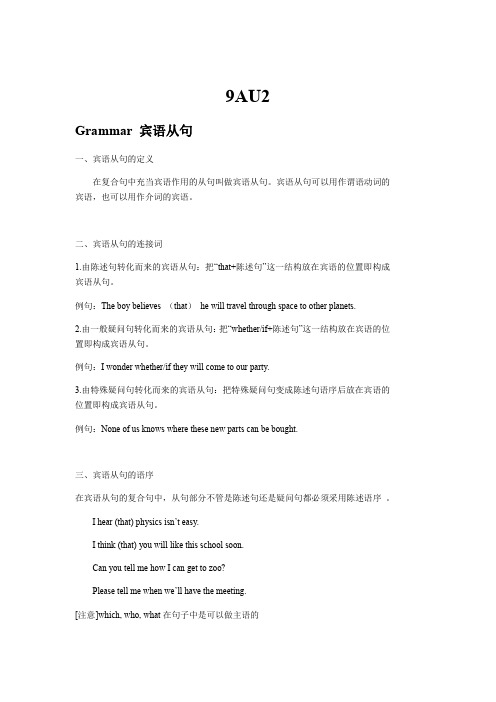
9AU2Grammar 宾语从句一、宾语从句的定义在复合句中充当宾语作用的从句叫做宾语从句。
宾语从句可以用作谓语动词的宾语,也可以用作介词的宾语。
二、宾语从句的连接词1.由陈述句转化而来的宾语从句:把“that+陈述句”这一结构放在宾语的位置即构成宾语从句。
例句:The boy believes (that)he will travel through space to other planets.2.由一般疑问句转化而来的宾语从句:把“whether/if+陈述句”这一结构放在宾语的位置即构成宾语从句。
例句:I wonder whether/if they will come to our party.3.由特殊疑问句转化而来的宾语从句:把特殊疑问句变成陈述句语序后放在宾语的位置即构成宾语从句。
例句:None of us knows where these new parts can be bought.三、宾语从句的语序在宾语从句的复合句中,从句部分不管是陈述句还是疑问句都必须采用陈述语序。
I hear (that) physics isn’t easy.I think (that) you will like this school soon.Can you tell me how I can get to zoo?Please tell me when we’ll have the meeting.[注意]which, who, what在句子中是可以做主语的I wonder who is Tom’s English teacher.I don’t know what can be avoided.四、宾语从句的时态1. 如果主句的时态是一般现在时,宾语从句该用什么时态就用什么时态。
I don’t think (that) you are right.Please tell us where he is.Can you tell me how I can get to the railway station?2. 如果主句的时态是一般过去时,宾语从句只能用相应的过去时态(一般过去时,过去进行时,过去将来时,过去完成时)。
B1-U2-grammar

过去时
一般过去时(Simple Past)
一般过去时是由动词后加-ed构成,但有不少不规则动词。其用法如下所述。
(1)表示过去经常发生的动作,经常和often, never, usually, always, sometimes, seldom, forever等表示频度 的时间状语连用。
EXAMPLE
EXAMPLE
How many English words had you learned by the end of last term? 到上学期末,你们学了多少英语单词? The train had already left before he got to the station. 他还没到车站,火车就已经开了。 More to Learn
Back to the Text
过去时
过去进行时(Past Progressive)
过去进行时由“was/were+动词的现在分词”构成,其用法如 下: (1)表示在过去的某一时刻或某一时间段正在进行或持 续进行的动作。
EXAMPLE
What were you doing at this time yesterday? 昨天这个时候你在做什么? I was writing a letter when he came in. 他进来时,我正在写信。
More to Learn
过去时
(2)表示过去某个时间发生的动作或存在的状态,常和 yesterday,last year (month, week … ),three years ago,a moment ago,in 1998等表示过去的时间状语连用。
EXAMPLE
I went to bed about ten last night. 我昨天晚上大约十点睡觉。 Tom was very thin when he was a child. 汤姆小时候非常瘦。
八年级英语上册译林版U2 Grammar
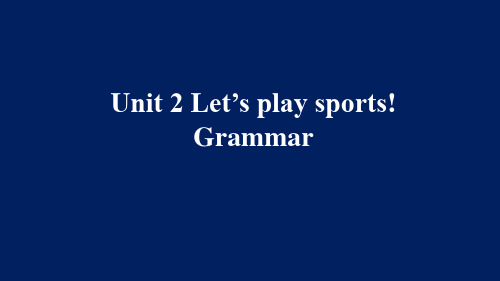
He/She/It He/She/It
likes does not like
sports. sports.
Does Yes, No,
he/she/it he/she/it he/she/it
like
does. does not.
sports?
内容回顾
当主语为第三人称单数he,she 或it 时,行为动词后加s的变化形式
__D_o__you __d_o___ your homework every evening? 3. She does morning exercises in the garden every morning.(改为一般疑问句)
Unit 2 Let’s play sports! Grammar
内容回顾
一、重要词组、句型 1.当然可以 2.在周末购物
of course sure shop at weekends
certainly
3.待在家里
stay at home
内容回顾
二、主要语法 在一般现在时的句子中,当主语是I,you,we,they或复数名词时, 行为动词用原形。
—___O_f___ __c_o_u_r_s_e_(当然).Here you are.
习题精练
二、根据句意,用括号中所给动词的适当形式填空 1. He often__h__a_s__(have) dinner at home. 2. _D__o_e_s_ she___ta_k_e_(take) a walk in the park every morning? 3. We usually have much homework, so we_d__o_n_’t_w__a_tc_h_(not watch) TV on weekdays. 4. She never_s_t_a_y_s_(stay) here for more than half an hour. 5. What __d_o___they usually__d_o____(do) during holidays? 6. Amy often_a_s_k_s___(ask) us to go swimming with her. 7. Hei_s_n__o_t/_is_n_’(tnot be) always right. Sometimes he_m_a_k_e_s_(make) mistakes (错误). 8. Li Hong often_w__a_s_h_e_s_(wash) clothes on Saturday morning. 9. Kitty, with her parents,_w__a_lk_s___(walk) the dog every morning. 10.Sam often__f_li_e_s____(fly) kites with his friends on windy days.
牛津译林版英语八上u2grammar(共40张ppt)

Daniel ¥10 ¥10
Millie
Kitty ¥5
¥ 10
the most money. Daniel has ________
Kitty has ________ the least money.
more more
less most
most fewest
fewer fewer
more least
该语法项的重难点。
与大多数形容词一样,副词也有比较级 和最高级,可用来修饰动词。
一、 构成 规则
单音节和个别双音 节副词加后缀–er和 -est构成比较级和最 高级。
例词
hard → harder → hardest high → higher → highest
规则 大部分双音节副词和 所有多音节副词前面 加more和most构成 比较级和最高级。
二、 句型 句型 比 A + 实义动词 + 比 较 较级+ than + B 级 例子 Tom works faster than David. I speak English more fluently now than last year. 最 A+实义动词+最 I jumped (the) highest in my class. 高级 (+of/in…) , 高 副词最高级前一 Our team played (the) 级 般省略the worst of all.
1. — Did you do better in math than Amy this time? — No, I didn’t. I got ______ points than her. A. less B. more C. fewer D. fewest 2. — Millie looks so slim. — Yes. She eats the ______ meat and the ______ vegetables of us. A. least; fewest B. least; most C. most; fewest D. fewest; most
7上新版牛津英语U2 Grammar

A1 Use the information in the article on Page 17 to complete the conversation below.
go Does Sam ______(go) S1: (1)_______ to school by bus? goes S2: No, he (2)________. to doesn't He (3)______(go) school on foot. Do play S1: (4)______ Sam and his friends _____(play) games during the morning break? S2: Yes, they (5)______. do S1: What (6)______ after school? does Sam _____(do) do takes S2: He (7)_______(take) part in the school band practice.
We have seven less主语 + am/ is/ are (表示状态)
主语(I/We/You/They)+动词原形
主语(He/She/It)+动词(s)
一般现在时的 否定形式 和 疑问形式
主语 + be (am, are, is) not I/ We / You/ They + don’t +动词原形 She/ He/ It + doesn’t +动词原形
Be (Am, Are, Is) + 主语 Do+ I/ we/ you/ they + 动词原形 Does+ she/ he/ it + 动词原形
必修二U2grammar
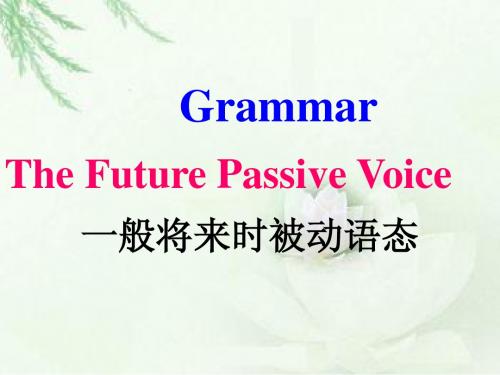
the future tense
the passive voice
shall / will + do
be + p.p.
How to change the sentences into passive voice ? 1.主+谓+宾 • 主动:We will build a new library next year. • 被动:A new library will be built ( by us ) next year.
一般将来时被动语态
肯定式: will / shall + be + done 否定式: will / shall + not / never + be + done 一般疑问式: Will / Shall + 主语 + be + done? 特殊疑问式: 疑问词 + will / shall + 主语 + be + done?
My mother will give me a new sweater. » new sweater will be given to me »A ( by my mother). My mother will buy me a new coat. »» A new coat will be bought for me ( by my mother ).
2.主+谓+间接宾语+直接宾语
①其中一宾语(间宾)改为主语,另一个不 变
• 主动: My mother will give me a new sweater. • 被动: I will be given a new sweater ( by my mother ).
牛津深圳版七年级上册英语U2 Grammar-最新
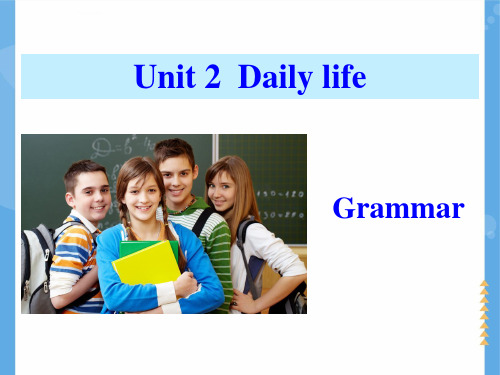
Unit 2 Grammar
A1 Use the information in the article on Page 17 to complete the conversation below.
S1: (1)__D_o_e_s__ Sam __g_o___(go) to school by bus? S2: No, he (2)__d_o_e_sn_'_t_. He (3)__g_o_e_s_(go) to
fly
flies
study studies
We usually change the -y into i and add -es to the
words ending in a consonant and -y.
给出下列动词的第三人称单数
talk_t_a_lk_s_ stop_s_to_p_s_ say_s_a_y_s_ fly__f_li_e_s make_m_a_k_e_s recite_r_ec_i_te_s drive_d_ri_v_e_s wake_w_a_k_e_s
My mother gets up at 6 o'clock every day and has breakfast at 6:30 a.m.
1. Statements:
I You play the guitar. We do not play the
guitar. They
Unit 2 Grammar
mine we our ours等第一人称分别改为相应的第二人 称you your yours等;
三问号:句末的句号改为问号 。 肯定句:
Mary is good at singing. 一般疑问句:
Is Mary good at singing? 肯定句:
U2 Grammar

1. All my friends are very great. I love them very much. 2. My school is very big. I love it very much. 3. Eddie is my dog. I walk him every day. 4. Your mum is right. You should listen to her. 5. They are lovely. Let me buy them for you. 6. Would you please give her a cake?
Complete the article. Sandy plays volleyball every Tuesday, Thursday and Friday. She is at the volleyball court from 4.00 p.m. to 5.00p.m. He They ____meets up with Simon and ______do their homework together. On Mondays and Wednesdays, Simon plays football. _____is a member of the school football He team.
4. Simon likes football. We often talk about ____ after school. it 5. Is Grandma at home now? I want to her say hello to ____. you 6. Sorry, I can’t hear ____ well. Can youversation. I Simon: Hello, Daniel. ___have good news. Daniel: Oh, what is the news? Is___ good? it Simon: Peter is now in the school football He team. ___ is really good. Daniel: I think ____are better. you Simon: Thank you. Peter and I both love football. ____play together all the We time. Daniel: Does Millie know about the news? Simon: Yes. _____is really happy. She
九下U2 Grammar 课件
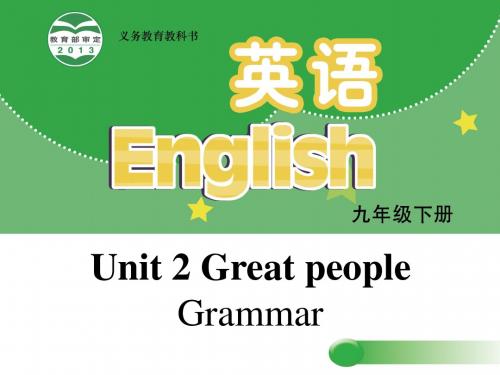
Your turn now!
The simple past tense (一般过去时)
Sentences
Simon played football yesterday. Simon came home, turned on the computer and checked his email.
Used for actions that happened in the past. Actions that happened one after another in the past.
I (1)will _________ have (have) a day out with my classmates this Saturday, so I (2) ________ (need) a pair of trainers. need Mum (3) __________ is shopping (shop) online for me now. is searching She often (4) shops _______ (shop) online. Dad (5) _________ (search) for Information on the Internet. will visit (visit) Japan next week. Grandpa He (6) ________ is reading (read) the newspaper and Grandma (7) ____________ is watching(watch) TV. I (9) _________ want (8) _________ (want) to writ go an email to Wendy before I (10) ______ (go) to bed.
- 1、下载文档前请自行甄别文档内容的完整性,平台不提供额外的编辑、内容补充、找答案等附加服务。
- 2、"仅部分预览"的文档,不可在线预览部分如存在完整性等问题,可反馈申请退款(可完整预览的文档不适用该条件!)。
- 3、如文档侵犯您的权益,请联系客服反馈,我们会尽快为您处理(人工客服工作时间:9:00-18:30)。
Daniel has _____ CDs ______ Kitty. fewer than
Simon
Sandy
Sandy has _______ orange juice ______ more than Simon. Simon has ____ orange juice _____ Sandy. less than
Sentences from this unit: 1. Among all my subjects, I like French best. 2. I often read more books than my classmates. 3. On Friday afternoon, our school ends earlier than usual.
1. — Did you do better in math than Amy this time? — No, I didn‘t. I got ______ points than her. A. less B. more C. fewer D. fewest
2. — Millie looks so slim. — Yes. She eats the ______ meat and the ______ vegetables of us. A. least; fewest B. least; most C. most; fewest D. fewest; most 3. Time is up. You need to eat ______. A. quicker B. more quick C. quicklier D. more quickly
3. Bill works harder than Joe and grows more flowers and vegetables, but Joe's garden is more interesting. (新概念第二册 L8) 4. One Monday, there were fewer people in the shop than usual when the woman came in, so it was easier for the detective to watch her. (新概念第二册 L32)
4. One Monday, there were _____ people fewer than in the shop ____ usual when the woman came in, so it was easier for the detective to watch her. 5. Among all my subjects, I like French best ____. more than 6. I often read _____ books ____ my classmates. 7. On Friday afternoon, our school ends earlier than ______ _____ usual.
Amy came first in the race. She ran the fastest.
More examples. 1. Amy写了最多的词。
Amy wrote the most words.
2. Simon写了最少的词。 Simon wrote the fewest words. 3. Daniel喝了最多的水。 Daniel drank the most water. 4. Kitty喝了最少的水。 Kitty drank the least water.
与大多数形容词一样,副词也有比较级 和最高级,可用来修饰动词。
一、 构成 规则
单音节和个别双音 节副词加后缀–er和 -est构成比较级和最 高级。
例词
hard → harder → hardest high → higher → highest
规则 大部分双音节副词和 所有多音节副词前面 加more和most构成 比较级和最高级。
Comparing more than two things
Questions: Who ran faster than Millie? Who ran the fastest?
Millie came third in the race. She ran fast. Sandy came second in the race. She ran faster than Millie.
Unit 2
School life
Grammar
Objectives
To learn to use ‗more … than‘, ‗fewer … than‘ and ‗less … than‘ to compare the amount of things To learn to use ‗the most‘, ‗the fewest‘ and ‗the least‘ To learn to use comparative and superlative adverbs
以上我们已经通过归纳总结和练习 对本课的语法内容有了一定的了解, 下面就让我们根据 之前练习的考察情 况进一步选择讲解
该语法项的重难点。
Millie has more tomatoes than Daniel. Millie has less rice than Daniel. Millie has fewer bananas than Kitty.
例词 quickly → more quickly → most quickly carefully → more carefully → most carefully 温馨提示:有些不规则变化我们应牢记, 如:well → better → best; badly → worse → worst; far → further/farther → furthest/farthest
to test your sense of observation to test your ability of short-term memory to test your ability to highlight the language points
Guess
best 1. Which of the subjects do you like ____, Eddie? 2. I have my own bedroom and bathroom, best and I like the balcony ____. 3. Bill works ______ than Joe and grows harder ____ more flowers and vegetables, but Joe's garden is more interesting.
Comparing two things
我们用 “more … than‖, ―fewer … than‖ 和“less … than‖比较两者之间数量的 多少。 few 用来修饰可数名词,less 用来修饰 不可数名词,more 既可以修饰可数名 词,也可以修饰不可数名词。
Complete the sentences with ―more … than‖, ―fewer … than‖ or ―less … than‖.
Look at the following sentences carefully. Try to figure out the usage of the colored words. 1. During this year‘s Reading Week, I read the most books in my class. 2. He‘s the best teacher, even though he has the least experience. 3. Which of you has made the fewest mistakes? 4. He gave the least money of all.
Kitty has the most eggs. Daniel has the fewest tomatoes. Millie has the least juice.
Look at the following sentences carefully. Try to figure out the usage of the colored words. 1. It‘s like watching TV, but there are fewer advertisements. 2. This is great because it takes less time than taking the bus.
Millie
Amy
Millie has _____ flowers _____ Amy. more than Amy has _____ flowers _____ Millie. fewer than
Daniel
Kitty
Kitty has _____ CDs ______ Daniel. more than
Words review
least further farther furthest farthest
adj. 最少的;最小的 adv. (far的比较级) 较远 adv. (far的最高级) 最远
Look at the following sentences. 1. Which of the subjects do you like best, Eddie? (七年级上册U3) 2. I have my own bedroom and bathroom, and I like the balcony best. (七年级下册U1)
Daniel ¥10 ¥10
